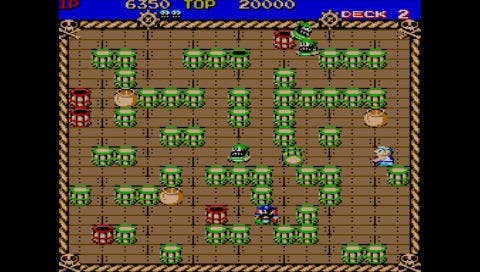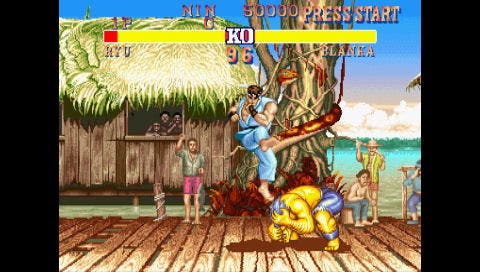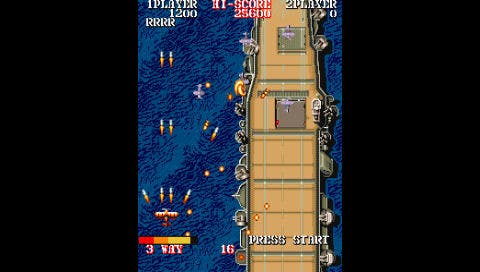Capcom Classics Collection Reloaded
A present from the past.
Like many stalwart publishers, Capcom has been busy spilling its retro guts over as many platforms as it can manage lately. And why not? When you've amassed a back catalogue as vast and impressive as this legendary company has over the decades, it seems almost rude to keep them locked away in the vaults, or, at best, the preserve of the emulation community. Besides, emulation has come so far that we're now, finally, in the position of being able to play perfectly replicated versions of our childhood faves on handheld systems like the PSP.
Perhaps mindful of the emulation crowd, Capcom has put a fair bit of effort into its PSP compilations. So much so, in fact, you really won't mind having to spend money on games that you've had sitting on your PC hard drive for years. Top of the list of Really Good Ideas is the presence of wireless multiplayer for six of the titles included. And it's not just any old wireless multiplayer: this is the holy grail, i.e. one that only requires one disc; something the previous 'Remix' selection neglected to offer.
The ability to play games like Mercs, 1943, Ghosts 'N Goblins, Pirate Ship Higemaru, Son Son, and King of Dragons in wireless multiplayer without having to buy a second copy of the game is a crucial feature that big retro fans will love [bear in mind it's time limited for about five minutes, though -Ed]. It's one of those things we wish was a standard feature of all handheld games, though it's a real shame it doesn't extend to titles like Street Fighter II, for instance - but with timing such an integral facet of the gameplay, perhaps Capcom felt that lag would destroy the entire experience.
Stretching it

Other cool features worth mentioning are things like the exhaustive stat tracking facility that breaks down your game performance to a truly obsessive degree. Meanwhile, the now-standard ability to stretch the screen every which way is still something we greatly appreciate for allowing us to play vertically oriented games the way nature intended. There are a bunch of slightly pointless unlockables that you can access, such as art, cheats and remix soundtracks, but that's something only absolute Capcom nuts will place any stock in.
But having built the premise of its PSP compilations on such solid foundations, Capcom deserves a bit of a ticking off for making the line-up of last year's 'Remixed' edition and this new 'Reloaded' selection so confusing for those of us also keeping up with the versions released on PS2 and Xbox. As you might recall from Dan's 6/10 review last summer, there was a certain amount of exasperation over the titles ditched. Well, it turns out that, in fact, what Capcom did was largely release the bulk (15 of the 20, to be precise) of its forthcoming Capcom Classics Volume 2 selection on the 'Remixed' PSP version, while most (16 of the 22) of Volume 1 has ended up on this 'Reloaded' compilation. And just to make it all the more unnecessary, five of the six Volume 1 games that don't make it to Reloaded appeared on Remixed, while the same applies to the Volume 2 games. For bonus confusion points, neither Tiger Road nor Trojan made it to either PSP compilation. Sheesh. If your heads hurts reading that sentence, imagine the torturous process unravelling what exactly ended up where. Why Capcom couldn't have just released Volumes 1 and 2 in the same fashion on PSP we'll never know.
Anyway. Moving on...
What's more important is establishing whether the games included on Reloaded are worth bothering with 15, 20 years on from their genesis. Sadly, what looks like a pretty generous compilation suffers by being padded out with multiple versions of the same game, or rehashes of popular titles with almost identical gameplay underneath the visuals. If there's one thing you can say about Capcom's game design ethos in the late '80s/early '90s is that it really knew how to milk a genre for all it was worth - and if you already own the Remixed compilation, you'll really be in a position to see just how many times Capcom repeated a particular formula.
Four seasons

Essentially, Capcom did roughly four types of games back in them dark olden days. Scrolling shoot-'em-ups, run and gun, platformers and beat-'em-ups. So on Reloaded you get a whole pile of regulation vertical shooters in the shape of 1942, 1943 and the essentially completest inclusion of the hardcore 1943 Kai. Meanwhile, Exed Exes (a.k.a Savage Bees) is an unapologetic reskin of 1942, so, already, you've got four solid but incredibly similar games right there. In the harsh light of 2007, all still stand up pretty well considering their age, but once you've played one, you've pretty much played all of them - and it hardly helps that the far more visually impressive 1941 appeared on the Remixed compilation. Elsewhere, the Xevious-esque Vulgus represents a solid but unimaginative earlier attempt at the vertical shooter, but its one-hit-death play mechanics makes long-term fun an unlikely prospect. Meanwhile, Eco Fighters is an excellent but pretty formulaic horizontal shooter that ticks all the right boxes - the fact that it was the result of a 'design a game' competition for the era is perhaps the most interesting thing about it.
And if Capcom wasn't busying itself making regulation ship shooters, it was more than happy to churn out plenty of run and gun shooters in the vein of Commando. Back in 1985, Commando was pretty much the most exciting arcade game of the period, and proved an enormous success on home systems. The slightly slower-paced dynamic and the worldwide obsession with Rambo at the same time paved the way for endless isometric games in the same vein for years afterwards. Like so many shooters, it relied on intimate knowledge of where all the enemies we're going to appear from, not to mention your reserves of luck and skill avoiding the many hazards. Playing it now, though, reminds us of how ludicrously unforgiving games were back then, with not only bullets killing you in one hit, but any contact whatsoever with enemies being considered 'death'. As a result, games were short, and success only ever came about through bloody-minded persistence and endless repetition.
In short, games like Commando and Gunsmoke have a huge nostalgia appeal for what they represented at the time, but are hideously tough to come to terms with these days. Mercs, meanwhile, was a logical progression from Commando and has a far saner design (an energy bar, for starters, and more destructive weaponry), and feels like one of the strongest games on the compilation as a result. Oddball scrolling platform shooter Son Son was a bit of a one-off for Capcom, kind of marrying the hop-between-the-platform premise of Imagine's Jumping Jack with the continually scrolling playfield of Scramble. It's fun for a few minutes, but another one of those you won't feel inclined to keep coming back to.
Killing for loose change

In terms of Capcom's 'proper' platformers, Reloaded represents a bit of an embarrassment of riches, with Ghosts 'N Goblins being joined by Ghouls 'N Ghosts and the SNES-only Super Ghouls 'N Ghosts (later ported to other console platforms). All three games were hugely acclaimed at the time, and among the most popular platform games of the era. Sadly, their appeal hasn't endured in the same way that, say, the Super Mario titles have by virtue of the fact that they're bordering on insanely difficult by today's standards. Again, saddled with one-hit-death mechanics and unrelenting enemies that swarm towards you with alarming regularity, modern gamers would burst into tears just getting off the first level. Rather like Commando, their place in the gaming hall of fame is forever assured, but they suffer from their coin-op legacy rather than benefit from it. Killing players to extract coins was a great business model back then, but now it just feels hideously annoying to be repeatedly killed because one pixel brushed past you. And that's coming from someone who adored these games back then. We've all gone soft, see.
As I said back in my original review for Volume 1 on PS2, Pirate Ship Higemaru is a true forgotten gem. Although basically a pirate-themed Pengu where you chuck barrels to see off your enemies instead of ice blocks, it's one of those absolute classic 2D games that belongs in the Mr Do, Dig Dug, Pac-Man, Timebomb, Tapper and Donkey Kong hall of fame. It really is that good.
Before we get too weepy, let's move on to the beat-'em-ups. Now, as with the Volume 1 selection, having three versions of Street Fighter II is a tad unnecessary, but if you've a particular penchant for one in particular, then you'll be well served with World Warrior, Champion Edition and Hyper Fighting all present (but no Turbo version, which appears on Volume 2 on PS2/Xbox). Sadly, regardless of how many characters you have to choose from, the PSP isn't really ever going to be a serious SF player's platform of choice thanks to a d-pad that's utterly unsuited to the control gymnastics expected. And, perhaps even worse is the endless loading pauses that have to be endured between each and every bout, and can't really be justified for a game that could have easily have been loaded into the PSP's memory, as is the case with every other game featured in the compilation.
The popularity of Final Fight (included on Remixed, remember) had a massive impact on arcade gaming for years, so it's hardly a great shock to see a few more clones thrown into the mix in the shape of Knights of the Round and King of Dragons. Although thematically akin to SEGA's Golden Axe, the controls, AI and level design are so similar to the Final Fight template that it's hard not to feel a bit jaded when faced with games that offered little more than what had gone before. Still, if you were a real fan of either of those games and maybe grew up with them at your local arcade, they're still excellent fun with a friend and converted perfectly.
All told, as much as these retro compilations feel very late in the day on static home consoles (we got over our obsessive MAME phase about, ooh, seven years ago), the pick up and play nature of every game here means that being able to own them as part of your handheld collection makes a whole lot more sense. Objectively, though, even though there are some big names on this collection, playing many of them these days is genuinely hard work - while even those that have stood the test of time like Street Fighter II simply don't translate well to the control limitations inherent on the PSP. There's certainly plenty of nostalgia to be had here - and for the money you can't really complain about a compilation that been created with a great deal of care - but sadly Capcom Classics Reloaded offers only a snapshot of what retro gaming offers.

